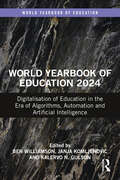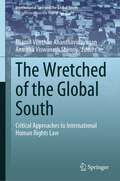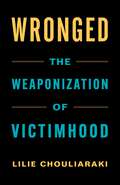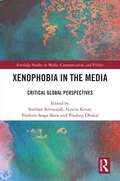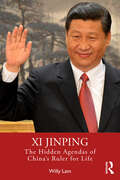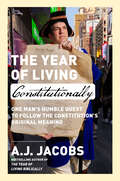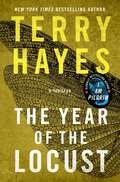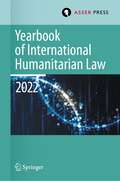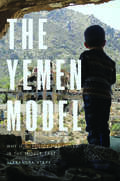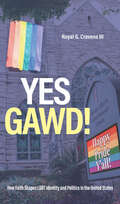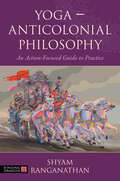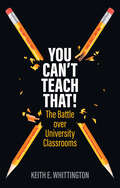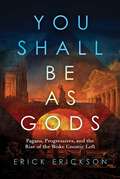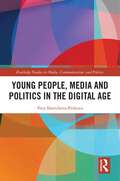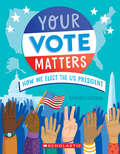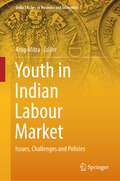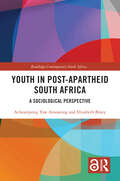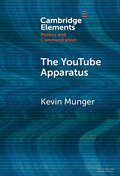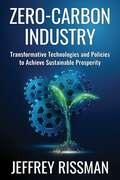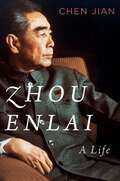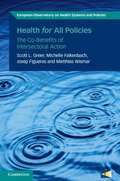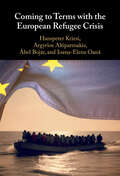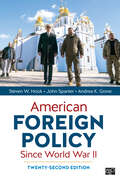- Table View
- List View
World Yearbook of Education 2024: Digitalisation of Education in the Era of Algorithms, Automation and Artificial Intelligence (World Yearbook of Education)
by Ben Williamson Janja Komljenovic Kalervo N. GulsonProviding a comprehensive, global overview of the digitalisation of education, the World Yearbook of Education 2024 examines the ways advanced digital technologies are transforming educational practices, institutions and policy processes.Establishing a critical research agenda for analysing the digitalisation of education, the carefully selected chapters in this collection interrogate the current impacts of new digital technologies, emerging controversies over emerging data practices and future implications of algorithmic systems, automated decision-making and AI in education. Organised into four sections, the contributions in the collection examine the following: The historical, scientific and technical foundations of contemporary digitalisation in education The political and economic dynamics that underpin the education technology industry and new platform models of education How algorithms, automation and AI support new modes of data-driven governance and control of education systems Controversies over the inequitable effects of digitalisation in education, and proposals for data justice, ethics and regulation This resource is ideal reading for researchers, students, educational practitioners and policy officials interested in understanding the future of digital technologies in education.
The Wretched of the Global South: Critical Approaches to International Human Rights Law (International Law and the Global South)
by Thamil Venthan Ananthavinayagan Amritha Viswanath ShenoyThe books aims to discuss and present an alternative epistemology of human rights, against the background of the globalization from below. The interdependent network of transnational networks, ranging from social movements, NGOs, and other groupings, questions the neoliberal paradigm and a particular set of human rights. This book wishes to transform this discourse on human rights and amplify the subaltern voices. The book also aims to highlight alternative practices of freedom that decenter human rights as a liberation discourse. Following Julia Suarez-Krabbe in “Race, Rights and Rebels”, the authors aim to amend to practices of freedom that center different orders of knowledge on subjectivity and agency. The proposed book, first, situates the problem of representation of the marginalized voices in contemporary legal and political discourse. Second, it offers critiques in theory, and, third, followed by alternative practices that emanate from marginalized localities. In particular, this book wishes to reflect upon alternatives rooted in legal and non-legal responses to address human rights grievances. In the end, this book envisages, along the lines of Frantz Fanon, to vision the possibility of the human by a new concept, addressing the concerns in various ways: As Fanon argued for “a new start”, “a new way of thinking”, and for the creation of a “new man”, it is pertinent to trigger a human rights project from the below.^
Wronged: The Weaponization of Victimhood
by Lilie ChouliarakiWhy is being a victim such a potent identity today? Who claims to be a victim, and why? How have such claims changed in the past century? Who benefits and who loses from the struggles over victimhood in public culture?In this timely and incisive book, Lilie Chouliaraki shows how claiming victimhood is about claiming power: who deserves to be protected as a victim and who should be punished as a perpetrator. She argues that even though victimhood has long been used to excuse violence and hierarchy, social media platforms and far-right populism have turned victimhood into a weapon of the privileged. Drawing on recent examples such as the overturning of Roe v. Wade, movements like #MeToo and Black Lives Matter, and the COVID-19 pandemic, as well as historical ones from the major wars of the twentieth century and the Civil Rights Movement, Wronged reveals why claims of victimization are so effective at reinforcing instead of alleviating inequalities of class, gender, and race. Unless we come to recognize the suffering of the vulnerable for what it is—a matter not of victimhood but of injustice—Chouliaraki powerfully warns, the culture of victimhood will continue to perpetuate old exclusions and enable further injuries.
Xenophobia in the Media: Critical Global Perspectives (Routledge Studies in Media, Communication, and Politics)
by Senthan Selvarajah Nesrin Kenar Ibrahim Seaga Shaw Pradeep DhakalThrough its global and critical perspectives, this book brings together knowledge, ideas, and tools to understand the problems and identify effective solutions, best practices and alternative approaches to combat xenophobia in the media and build tolerance and social cohesion. Although various studies have been conducted on the extent to which the media construct xenophobic discourse against immigrants and refugees and how they represent immigrants, there exists a research lacuna as to the dynamics of the xenophobia construction in the media, the effect of xenophobic discourse of the media and its function, the nexus between xenophobia construction of the media and the social, economic and political conditions, and the impact of the xenophobic discourse of the media on immigrants and host communities. This book adds knowledge and empirical evidence to fill this research gap. This book will be an important resource for journalists, scholars and students of media and communication studies, journalism, political science, sociology, and anyone covering issues of race and racism, human rights, immigration and refugees.
Xi Jinping: The Hidden Agendas of China's Ruler for Life
by Willy LamThis book examines the policy, ideology and politics of Xi Jinping, State President and General Secretary of the Chinese Communist Party (CCP) and China’s “ruler for life.” Through comparisons with former CCP leaders, including Deng Xiaoping, it assesses whether, having abandoned many of the key precepts of the Era of Reform and the Open Door, the conservative supreme leader’s restitution of Maoist standards might enable China to sustain economic growth and project hard and soft power worldwide. The book also examines whether the Communist Party will succeed in retaining the support of 1.4 billion Chinese in the face of unprecedented challenges in the economic and geopolitical arenas. It also provides a comprehensive picture of Xi’s rise to power; his AI-assisted and “legalistic” surveillance and control mechanisms; China’s evolving economic system; Xi’s foreign and national-security policies and the implications of the 20th Party Congress of October 2022 from both domestic and foreign perspectives. Being among the first books in English on the ambitious and multi-faceted agendas that Xi has laid out taking China up to the early 2040s, this will be an invaluable resource for students and scholars of Chinese studies, China-US relations, East Asian politics and Contemporary Asian history.
The Year of Living Constitutionally: One Man's Humble Quest to Follow the Constitution's Original Meaning
by A.J. JacobsThe New York Times bestselling author of The Year of Living Biblically chronicles his hilarious adventures in attempting to follow the original meaning of the Constitution, as he searches for answers to one of the most pressing issues of our time: How should we interpret America&’s foundational document?&“I didn&’t know how I learned so much while laughing so hard.&”—Andy BorowitzA.J. Jacobs learned the hard way that donning a tricorne hat and marching around Manhattan with a 1700s musket will earn you a lot of strange looks. In the wake of several controversial rulings by the Supreme Court and the on-going debate about how the Constitution should be interpreted, Jacobs set out to understand what it means to live by the Constitution.In The Year of Living Constitutionally, A.J. Jacobs tries to get inside the minds of the Founding Fathers by living as closely as possible to the original meaning of the Constitution. He asserts his right to free speech by writing his opinions on parchment with a quill and handing them out to strangers in Times Square. He consents to quartering a soldier, as is his Third Amendment right. He turns his home into a traditional 1790s household by lighting candles instead of using electricity, boiling mutton, and—because women were not allowed to sign contracts— feebly attempting to take over his wife&’s day job, which involves a lot of contract negotiations.The book blends unforgettable adventures—delivering a handwritten petition to Congress, applying for a Letter of Marque to become a legal pirate for the government, and battling redcoats as part of a Revolutionary War reenactment group—with dozens of interviews from constitutional experts from both sides. Jacobs dives deep into originalism and living constitutionalism, the two rival ways of interpreting the document.Much like he did with the Bible in The Year of Living Biblically, Jacobs provides a crash course on our Constitution as he experiences the benefits and perils of living like it&’s the 1790s. He relishes, for instance, the slow thinking of the era, free from social media alerts. But also discovers the progress we&’ve made since 1789 when married women couldn&’t own property.Now more than ever, Americans need to understand the meaning and value of the Constitution. As politicians and Supreme Court Justices wage a high-stakes battle over how literally we should interpret the Constitution, A.J. Jacobs provides an entertaining yet illuminating look into how this storied document fits into our democracy today.
The Year of the Locust: A Thriller
by Terry HayesTerry Hayes, author of the #1 global bestseller I Am Pilgrim, returns with this terrifying and eagerly awaited instant bestseller.If, like Kane, you&’re a Denied Access Area spy for the CIA, then boundaries have no meaning. Your function is to go in, do whatever is required, and get out again—by whatever means necessary. You know when to run, when to hide—and when to shoot. But some places don&’t play by the rules. Some places are too dangerous, even for a man of Kane&’s experience. The badlands where the borders of Pakistan, Iran, and Afghanistan meet are such a place—a place where violence is the only way to survive. Kane travels there to exfiltrate a man with vital information for the safety of the West—but instead he meets an adversary who will take the world to the brink of extinction. A frightening, clever, vicious man with blood on his hands and vengeance in his heart...
Yearbook of International Humanitarian Law, Volume 25: International Humanitarian Law and Neighbouring Frameworks (Yearbook of International Humanitarian Law #25)
by Heike Krieger Pablo Kalmanovitz Eliav Lieblich Stavros Evdokimos PantazopoulosVolume 25 of the Yearbook of International Humanitarian Law (IHL) sheds light on the interplay between IHL and other adjacent branches of international law. This Volume moves beyond the traditional preoccupation of examining IHL’s relations with international human rights law, the law on the use of force and international criminal law. Authors were invited to discuss, both in general and specific terms, doctrinally and theoretically, interactions between IHL and other neighbouring frameworks. Accordingly, this Volume is dedicated to exploring the interrelationship between IHL and other adjacent frameworks, such as international environmental law, international investment law, the law on defences to state responsibility, and counter-terrorism law.The Volume contains four articles dedicated to the subject of IHL and neighbouring frameworks. The Volume further features a Focus section on IHL controversies arising from Russia’s aggression against Ukraine, and ends, as usual, with a Year in Review section.The Yearbook of International Humanitarian Law is a leading annual publication devoted to the study of international humanitarian law. The Yearbook has always strived to be at the forefront of the debate of pressing doctrinal questions of IHL, and will continue to do so in the future. As this Volume demonstrates, it offers a space where IHL-related issues can be explored both from a doctrinal and a theoretical perspective. It provides an international forum for high-quality, peer-reviewed academic articles focusing on this crucial branch of international law.Distinguished by contemporary relevance, the Yearbook of International Humanitarian Law bridges the gap between theory and practice and serves as a useful reference tool for scholars, practitioners, military personnel, civil servants, diplomats, human rights workers, and students.
The Yemen Model: Why U.S. Policy Has Failed in the Middle East
by Alexandra StarkA close look at failed U.S. policies in the Middle East, offering a fresh perspective on how best to reorient goals in the region In this book Alexandra Stark argues that the U.S. approach to Yemen offers insights into the failures of American foreign policy throughout the Middle East. Stark makes the case that despite often being drawn into conflicts within Yemen, the United States has not achieved its policy goals because it has narrowly focused on counterterrorism and regional geopolitical competition rather than on the well-being of Yemenis themselves. She offers recommendations designed to reorient U.S. policy in the Middle East in pursuit of U.S. national security interests and to support the people of these countries in their efforts to make their own communities safe, secure, and prosperous.
Yes Gawd!: How Faith Shapes LGBT Identity and Politics in the United States (Religious Engagement in Democratic Politics)
by Royal G. Cravens IIIYes Gawd! explores the effects of religious belief and practice on political behavior among the LGBT community, a population long persecuted by religious institutions and generally considered to be non-religious. Royal Cravens deftly shows how faith impacts the politics of LGBT people. He details how the queer community creates, defines, and experiences spirituality and spiritual affirmation as well as the consequences this has for their identity, socialization, and political development. Cravens also demonstrates the mobilizing power of faith for LGBT people by contrasting the effects of participation in faith and secular communities on political activism. He explores how factors such as coming out, race, and LGBT-affirming churches influence political attitudes and behavior and explains how the development of LGBT politico-religious activism provides opportunities for LGBT people to organize politically. Ultimately, Cravens provides a cohesive account of how religion acts as a catalyst for and facilitator in the political development of LGBT people in the United States. In the process, he shows that there is room for both religion in LGBT communities and LGBT people in religious communities.
Yoga – Anticolonial Philosophy: An Action-Focused Guide to Practice
by Shyam RanganathanProviding a decolonial, action-focused account of Yoga philosophy, this practical work from Dr. Shyam Ranganathan, pioneering scholar in the field of Indian moral philosophy, focuses on the South Asian tradition to explore what Yoga was like prior to colonization. It challenges teachers and trainees to reflect on the impact of Western colonialism on Yoga as well as understand Yoga as the original decolonial practice in a way that is accessible. Each chapter takes the reader through a journey of sources and traditions, beginning with an investigation into the colonial -Platonic and Aristotelian- approaches to pedagogy in colonized yoga spaces, through contrary, ancient philosophies of South Asia, such as Jainism, Buddhism, Sankhya, and various forms of Vedanta, to sources of Yoga, including the Upanisads, Yoga Sutra, Bhagavad Gita and Hatha Yoga Pradipika. With discussions of the precolonial philosophy of Yoga, its relationship to social justice, and modern postural yoga's relationship with colonial trauma, this is a comprehensive guide for any yoga teacher or trainee to activate and synergize their practice. Supplementary online resources bring the text to life, making this the perfect text for yoga teacher trainings.
You Can't Teach That!: The Battle over University Classrooms
by Keith E. WhittingtonWho controls what is taught in American universities – professors or politicians? The answer is far from clear but suddenly urgent. Unprecedented efforts are now underway to restrict what ideas can be promoted and discussed in university classrooms. Professors at public universities have long assumed that their freedom to teach is unassailable and that there were firm constitutional protections shielding them from political interventions. Those assumptions might always have been more hopeful than sound. A battle over the control of the university classroom is now brewing, and the courts will be called upon to establish clearer guidelines as to what – if any – limits legislatures might have in dictating what is taught in public universities. In this path-breaking book, Keith Whittington argues that the First Amendment imposes meaningful limits on how government officials can restrict the ideas discussed on university campuses. In clear and accessible prose, he illuminates the legal status of academic freedom in the United States and shows how existing constitutional doctrine can be deployed to protect unbridled free inquiry.
You Shall Be as Gods: Pagans, Progressives, and the Rise of the Woke Gnostic Left
by Erick EricksonOur country doesn&’t have a partisan problem, a political problem, a social problem, or an economic problem. We have a spiritual problem.What in the world is happening? To many Americans, it feels as if reality itself has been turned upside down. Speaking truth, or even suggesting such a thing exists, is labeled as oppression and cause for social banning. Judeo-Christian values once taken for granted are not only routinely ignored, but openly attacked. Why is America being fundamentally transformed before our eyes?As Christianity has been pushed aside, the Progressive Left has developed a new pagan religion complete with all the trappings: creeds, confessionals, sacraments and mantras, liturgies, shunnings, sacred books, redemptive rituals, and priests and priestesses. But the radical roots of the new secular religion are ancient. We&’ve seen it all before. In You Shall Be as Gods, Erick Erickson traces the religion&’s roots from Paganism and Gnosticism through the Age of Enlightenment all the way into the Postmodernism of the 21st century. At the heart of the ancient religion is a self-centered culture.The Christian church today has been weakened by compromising with the neo-pagan religion, leaving the faithful confused and ill-prepared to counter the claims of society&’s present-day doctrine. Yet there remains a significant remnant, perhaps even a silent majority, in America that refuses to bow to the rising belief system.Just as in Rome and countless societies throughout history, the religions present two opposing stories of reality which necessitates conflict. In an era where the &“Christian thing&” to do seems to be to go along and get along, Erickson makes clear that the two cultures cannot peacefully coexist and calls the reader to speak the truth in love.
Young People, Media and Politics in the Digital Age (Routledge Studies in Media, Communication, and Politics)
by Vera Slavtcheva-PetkovaThe book explores the relationship among young people, politics and the media. It presents a novel multidimensional analytical framework – The Circle Line Media Model, which accounts for the importance of a range of processes, actors and social structures in the political socialisation process. By defining political socialisation as a lifelong interactive process that develops civic cultures, collective identities and citizenship, underpinned by social structures, nationality and generational order, the author draws attention to its manifestation in acts of political participation and interactions with authoritative actors such as school/teachers, family, the media and friends/peers. The volume’s longitudinal study on young people, Europe and the media spanning 13 years of research in two very different countries also makes recommendations for more effectively engaging young people with politics and political media based on Generation Z’s own views about current deficiencies in their relationship with news media. Shedding new light on the changing nature of young people’s engagement with politics, this book will be of interest to researchers, lecturers/professors and upper level undergraduate and postgraduate students in the fields of media studies, communication and journalism studies as well as politics and sociology.
Your Vote Matters: How We Elect the US President
by Rebecca KatzmanThis engaging and comprehensive illustrated guide will answer all kids' questions about how the president is elected!There's never been a timelier moment for kids to learn the importance of voting. Your Vote Matters walks readers through all the ins and outs of voting in America -- and more specifically, voting in presidential elections.This easy-to-understand guide explains every step in the presidential election process -- from who is eligible to run for president to what the president does once they are sworn into office. Learn about campaigning and debates, the difference between caucuses and primaries, and how the Electoral College works, plus information about who is eligible to vote; the many different ways citizens can vote on (and leading up to) Election Day; what happens after the final ballots are cast; and tips on what to consider when deciding which candidate should get your vote.Each page of this nonfiction guidebook also features full-color artwork, including photographs, maps, illustrations, charts, and infographics aimed at making the information inside as accessible and kid-friendly as possible.Your Vote Matters is the perfect book to not only help kids understand how elections work -- but why it's important to participate in every single one.
Youth in Indian Labour Market: Issues, Challenges and Policies (India Studies in Business and Economics)
by Arup MitraThis book addresses labour market participation issues of youth in India, and follows an inter-disciplinary approach. It carries out both quantitative and qualitative assessments for an in-depth understanding of these issues. It collates a wide range of concerns both from supply and demand side, and instead of reflecting on the empirical questions only, the book reflects on various analytical questions as well. Some other challenges being discussed here are inadequacy of skill and compulsion to participate in the labour market, concentration in activities with excess supplies of labour, unrecognised work experience, lack of upward mobility, and working with information asymmetry. Caste and gender disadvantages are an instrumental part of the book. Problems of educated and uneducated youth are quite different and the book analyses them separately. Besides, it refers to a wide range of issues relating to occupational flexibility. It also discusses skill imparting institutions and themajor lacuna associated with their functioning. Social unrest and threats to the prospects of future growth in the absence of adequate youth employment are some of the economic and political issues which the book covers. Unraveling the threads of the concerns mentioned above, the book finally comes up with policy suggestions. It is a great resource for researchers, industry watchers, and policy makers who are interested in inclusive and sustainable growth.
Youth in Post-Apartheid South Africa: A Sociological Perspective (ISSN)
by Acheampong Yaw Amoateng Elizabeth BineyThis book investigates the life experiences of youth in South Africa, considering whether contemporary youth have benefitted from the socioeconomic reconstruction of post-apartheid society.Student protests against apartheid drove transformative change in South Africa, and the subsequent new constitution promised positive change for the nation’s youth across a range of sectors. Adopting a sociological perspective, this book uses primary and secondary data sources to illustrate the myriad ways post-apartheid socioeconomic developments have impacted the life experiences of the country’s youth across areas including health, education, family life, economic activity, technology, substance use, and politics. The book considers the historical legacy of colonialism, racism and immigration in shaping the context in which youth experiences in the country have evolved. The book argues that in 1976 South Africa’s youth became the conscience of the nation when they brought the apartheid regime to its knees during the Soweto uprising. What happens to them now will continue to define the nation’s future.This book will be of interest to researchers across the social sciences, most especially in the fields of Sociology, Demography, Development Studies, and Psychology.
The YouTube Apparatus (Elements in Politics and Communication)
by null Kevin MungerThe academic agenda for studying social media and politics has been somewhat haphazard. Thanks to rapid technological change, a cascade of policy-relevant crises, and sheer scale, we do not have a coherent framework for deciding what questions to ask. This Element articulates such a framework by taking existing literature from media economics and sociology and applying it reflexively, to both the academic agenda and to the specific case of politics on YouTube: the Supply and Demand Framework. The key mechanism, traced over the past century, is the technology of audience measurement. The YouTube audience comes pre-rationalized in the form of Likes, Views and Comments, and is thus unavoidable for all actors involved. The phenomenon of 'radicalization' is best understood as a consequence of accelerated feedback between audiences and creators, radicalizing each other. I use fifteen years of supply and demand data from YouTube to demonstrate how different types of producers respond more or less to this feedback, which in turn structures the ideological distribution of content consumed on the platform.
Zero-Carbon Industry: Transformative Technologies and Policies to Achieve Sustainable Prosperity (Center on Global Energy Policy Series)
by Jeffrey RissmanThe power sector and transportation tend to dominate conversations about climate change, but there’s an under-the-radar source of climate pollution that must be addressed: industry. Globally, industrial activity is responsible for one-third of human-caused greenhouse gas emissions. Though industry is a major emitter, it is essential for producing the tools we need to fight climate change—like wind turbines, solar panels, and electric vehicles—and for meeting our everyday needs. How can industry eliminate its climate pollution while supplying transformational technologies?This book delivers a first-of-its-kind roadmap for the zero-carbon industrial transition, spotlighting the breakthrough innovations transforming the manufacturing sector and the policies that can accelerate this global shift. Jeffrey Rissman illustrates the scope of the challenge, diving into the workings of heavy polluters like steel, chemicals, plastics, cement, and concrete. He examines ways to affordably decarbonize manufacturing, such as electrifying industrial processes, using hydrogen, deploying carbon capture and storage, and growing material efficiency with lightweighting and 3D printing. But technologies are only part of the picture. Enacting the right policies—including financial incentives, research and development support, well-designed carbon pricing, efficiency and emissions standards, and green public procurement—can spur investment and hasten emissions reductions. Rissman provides a framework to ensure that the transition to clean industry enhances equity, health, and prosperity for communities worldwide.Engaging and comprehensive, Zero-Carbon Industry is the definitive guide to decarbonizing the vast—yet often overlooked—global industrial sector.
Zhou Enlai: A Life
by Jian ChenThe definitive biography of Zhou Enlai, the first premier and preeminent diplomat of the People’s Republic of China, who protected his country against the excesses of his boss—Chairman Mao.Zhou Enlai spent twenty-seven years as premier of the People’s Republic of China and ten as its foreign minister. He was the architect of the country’s administrative apparatus and its relationship to the world, as well as its legendary spymaster. Richard Nixon proclaimed him “the greatest statesman of our era.” Yet Zhou has always been overshadowed by Chairman Mao. Chen Jian brings Zhou into the light, offering a nuanced portrait of his complex life as a revolutionary, a master diplomat, and a man with his own vision and aspirations who did much to make China, as well as the larger world, what it is today.Born to a declining mandarin family in 1898, Zhou received a classical education and as a teenager spent time in Japan. As a young man, driven by the desire for China’s development, Zhou embraced the communist revolution as a vehicle of China’s salvation. He helped Mao govern through a series of transformations, including the disastrous Great Leap Forward and Cultural Revolution. Yet, as Chen shows, Zhou was never a committed Maoist. His extraordinary political and bureaucratic skill, combined with his centrist approaches, enabled him to mitigate the enormous damage caused by Mao’s radicalism.When Zhou died in 1976, the PRC that we know of was not yet visible on the horizon; he never saw glistening twenty-first-century Shanghai or the broader emergence of Chinese capitalism. But it was Zhou’s work that shaped the nation whose influence and power are today felt in every corner of the globe.
Zivilgesellschaft und Stadtöffentlichkeit: Eine akteurszentrierte Analyse der kommunikativen Figuration der Stadt
by Katharina Heitmann-WernerStadtöffentlichkeiten sind bunt, vielfältig und heterogen. Besonders deutlich wird dies bei der Analyse der beteiligten Akteure. Denn während klassische Öffentlichkeitsakteure, wie etwa lokale Medien bereits vielfach wissenschaftlich erforscht worden sind, nimmt dieses Buch eine Akteursgruppe unter die Lupe, die bisher aus kommunikations- und medienwissenschaftlicher Perspektive wenige Beachtung erfahren hat. Zivilgesellschaftliche Kollektive wie Sportvereine, soziale Bewegungen oder Kunst- und Kultureinrichtungen prägen mit ihren vielfältigen Angeboten und Aktionen das Stadtbild. Gleichzeitig prägen sie auch die städtische Öffentlichkeit, indem sie sich aktiv an ihrer Konstitution beteiligen. Die Autorin identifiziert sieben unterschiedliche Typen zivilgesellschaftlicher Kollektive, die jeweils ganz eigene Medienpraktiken und -ensembles zur öffentlichen Kommunikation einsetzen. Sie verfolgen dabei sehr unterschiedliche Ziele innerhalb der Stadtöffentlichkeit und agieren innerhalbjeweils sehr verschiedener Netzwerke. Das Buch stellt die äußerst relevante Rolle dieser Akteure bei der Öffentlichkeitskonstitution heraus und zeigt, dass es gewinnbringend ist, Akteure von Stadtöffentlichkeiten nicht isoliert zu erforschen, sondern innerhalb ihrer Beziehungsgefüge zu anderen Akteuren der Stadtöffentlichkeit.
Health for All Policies: The Co-Benefits of Intersectoral Action (European Observatory on Health Systems and Policies)
by Scott L. Greer Michelle Falkenbach Josep Figueras Matthias WismarFactors outside of healthcare services determine our health and this involves many different sectors. Health for All Policies changes the argument about inter-sectoral action, from one focusing on health and the health sector to one based on co-benefits – a 'Health for All Policies' approach. It uses the Sustainable Development Goals as the framework for identifying goals across sectors and summarizes evidence along two causal axes. One is the impact of improved health status on other SDGs, e.g. better educational and employment results. The other is the impact of health systems and policies on other sectors. The 'Health for All Policies' approach advocated in this book is thus a call to improve health to achieve goals beyond health and for the health sector itself to do better in understanding and directing its impact on the world beyond the healthcare it provides. This title is also available as Open Access on Cambridge Core.
Coming to Terms with the European Refugee Crisis
by null Hanspeter Kriesi null Argyrios Altiparmakis null Ábel Bojár null Ioana-Elena OanăThe refugee crisis which hit the European Union and its member states during 2015–16 was just one in a series of recent crises, but perhaps the most critical for the EU's resilience. This book shows how policymakers in the EU polity have tried to come to terms with it. To explain how they reacted to the crisis domestically and jointly at the EU-level, the study relies on an original method to analyze political processes. It argues that the policy-specific institutional context and the specific crisis situation, defined in terms of asymmetrical problem and political pressure, largely shaped the crisis response. The authors suggest that the way in which the refugee crisis was managed has resulted in conflicts between member states, which have been further exacerbated in subsequent crises and will continue to haunt the EU in times to come. This title is also available as Open Access on Cambridge Core.
American Foreign Policy Since World War II
by Steven W. Hook John W. Spanier Andrea K. GroveNow in its Twenty-Second Edition, Hook, Spanier, and Grove’s American Foreign Policy Since World War II has long set the standard in guiding students through the complexities of American foreign policy. The text introduces students to the American "style" of foreign policy, imbued with a distinct sense of national exceptionalism. By giving students the historical context they need, this book allows them to truly grasp the functions and dysfunctions of the nation’s foreign policy agenda with historical insight into modern policy context.
American Foreign Policy Since World War II
by Steven W. Hook John W. Spanier Andrea K. GroveNow in its Twenty-Second Edition, Hook, Spanier, and Grove’s American Foreign Policy Since World War II has long set the standard in guiding students through the complexities of American foreign policy. The text introduces students to the American "style" of foreign policy, imbued with a distinct sense of national exceptionalism. By giving students the historical context they need, this book allows them to truly grasp the functions and dysfunctions of the nation’s foreign policy agenda with historical insight into modern policy context.
